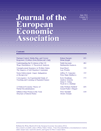
Journal of the European Economic Association
Scope & Guideline
Navigating Complex Economic Challenges with Scholarly Rigor
Introduction
Aims and Scopes
- Economic Growth and Development:
The journal frequently publishes research on the determinants of economic growth, including the role of institutions, government policies, and social factors affecting development. - Behavioral Economics:
There is a consistent focus on behavioral economics, exploring how psychological and social factors influence economic decision-making, including studies on biases, preferences, and social norms. - Public Policy and Regulation:
Research often addresses the implications of public policies and regulations on various sectors, including labor markets, healthcare, and environmental policies, providing insights into effective governance. - Labor Economics:
The journal features studies on labor economics that analyze employment dynamics, wage disparities, and the impact of educational policies on labor markets. - Trade and Globalization:
A significant area of focus is on international trade and globalization, examining how trade policies, market access, and global supply chains affect economic outcomes. - Political Economy:
The journal also emphasizes the intersection of economics and politics, investigating how political structures and electoral dynamics influence economic policies and outcomes.
Trending and Emerging
- Digital Economy and Technology:
There is a notable increase in research related to the digital economy, including the impact of technology on markets, labor, and economic behavior, reflecting the growing significance of digitalization in economic studies. - Environmental Economics:
Emerging themes in environmental economics are gaining traction, particularly studies examining the economic implications of climate change, sustainability, and regulatory frameworks for environmental protection. - Inequality and Social Justice:
Research addressing economic inequality, social mobility, and the impact of policies on marginalized communities has become more prominent, highlighting the journal's commitment to addressing pressing social issues. - Health Economics:
The COVID-19 pandemic has spurred a surge in health economics research, focusing on health policy, healthcare access, and the economic consequences of health interventions. - Migration and Labor Mobility:
There is an increasing focus on migration, labor mobility, and their economic impacts, as global migration patterns evolve and become more relevant to economic discussions.
Declining or Waning
- Traditional Macroeconomic Models:
Research focusing on classical macroeconomic models has diminished, possibly due to a growing preference for behavioral and empirical approaches that incorporate real-world complexities. - Purely Theoretical Contributions:
There seems to be a decline in purely theoretical papers that do not engage with empirical data, as the journal increasingly prioritizes studies with practical implications and real-world applications. - Regional Economic Studies:
Papers focusing solely on regional economic analyses, without broader implications for economic theory or policy, have become less frequent, indicating a shift towards more globally relevant topics.
Similar Journals
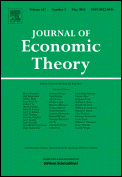
JOURNAL OF ECONOMIC THEORY
Unveiling the Dynamics of Economic TheoryThe JOURNAL OF ECONOMIC THEORY, published by Academic Press Inc Elsevier Science, stands as a paramount platform for disseminating groundbreaking research within the field of economics and econometrics. With an impressive history dating back to 1969 and a convergence period extending to 2024, this journal has continually shaped the academic discourse around critical economic theories and methodologies. Currently recognized in the top quartile (Q1) of its category for 2023, it ranks prominently among its peers, boasting an impactful scholarly contribution reflected in its Scopus ranking—positioned at #348 out of 716 journals in the domain. Although it does not offer Open Access, the journal provides an essential resource for those seeking to enhance their understanding of complex economic models and strategies. Researchers, professionals, and students alike will find the JOURNAL OF ECONOMIC THEORY to be an invaluable asset for their academic and professional pursuits in the rapidly evolving landscape of economics.
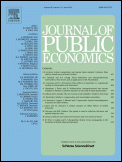
JOURNAL OF PUBLIC ECONOMICS
Transforming public economics with influential research.JOURNAL OF PUBLIC ECONOMICS is a leading academic journal published by ELSEVIER SCIENCE SA, dedicated to the field of public economics, which encompasses a broad range of topics including taxation, government expenditure, and the effects of public policies on the economy. With an impressive impact factor reflected by its prestigious Q1 category rankings in both Economics and Finance, this journal is recognized as a vital resource for researchers and practitioners alike. Its robust Scopus rankings place it in the top percentile, with Finance ranked #8 out of 317 and Economics ranked #19 out of 716, demonstrating its influential role in advancing knowledge and fostering discourse within its discipline. Covering the period from 1972 through 2024, the journal publishes original research and insightful reviews that encourage evidence-based policy-making, making it an essential read for those seeking to deepen their understanding of the intersections between economics and public policy. Please note that the journal operates under a subscription model of access, ensuring high-quality content is readily available to its readership.

Quantitative Economics
Pioneering the intersection of data and economic understanding.Quantitative Economics is a leading open-access journal published by WILEY, dedicated to advancing the field of economics through rigorous quantitative analysis. Established in 2010 and based in the United States, this influential journal boasts an impressive Q1 rating in the 2023 category of Economics and Econometrics, reflecting its high impact and quality within the field. With a Scopus ranking of #222 out of 716 in the Economics and Econometrics category, it sits comfortably in the 68th percentile, underscoring its relevance to researchers and professionals alike. The journal accepts a wide range of submissions, including original research articles, methodological advancements, and comprehensive reviews, which contribute to the understanding and application of quantitative methods in economic research. By providing immediate open access to all published articles, Quantitative Economics ensures that vital findings are readily available to academics, policymakers, and students across the globe, enhancing collaboration and innovation within the discipline.
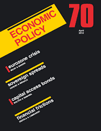
ECONOMIC POLICY
Cutting-edge Insights into Policy and PracticeECONOMIC POLICY is a leading academic journal published by Oxford University Press, focusing on a broad spectrum of topics within the field of economics and related disciplines. With its ISSN 0266-4658 and E-ISSN 1468-0327, the journal serves as a vital platform for disseminating cutting-edge research and innovative policy analysis critical to both scholars and practitioners. As a testament to its quality and significance, ECONOMIC POLICY is classified in the Q1 quartile for both Economics and Econometrics and Management, Monitoring, Policy, and Law, and boasts impressive rankings within Scopus—placing it in the top 25% of its respective fields. Operating from the esteemed Oxford campus in the United Kingdom, the journal has produced a wealth of knowledge since its inception in 1988, with plans to continue shaping economic discourse through 2024 and beyond. While the journal does not offer Open Access options, it remains a cornerstone for anyone dedicated to understanding the complexities of economic policy and its impact on global society.
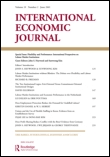
INTERNATIONAL ECONOMIC JOURNAL
Advancing Economic Thought, One Article at a Time.Welcome to the INTERNATIONAL ECONOMIC JOURNAL, a premier publication dedicated to advancing the fields of economics, econometrics, and finance. Established in 1987 and published by Taylor & Francis Ltd, this journal has consistently contributed to scholarly discourse and empirical research. With an impressive 2023 Scopus Ranking placing it at #112 out of 288 in its category, the journal holds a commendable Q2 quartile rating, reflecting its significant impact among economists and financial analysts alike. The INTERNATIONAL ECONOMIC JOURNAL serves as a vital platform for researchers and professionals to disseminate innovative findings, theoretical advancements, and practical applications in economic theory and policy. While not open access, the journal continues to attract a wide readership, offering insight into global economic trends and challenges. This makes it an essential resource for students, academics, and industry practitioners aiming to deepen their understanding of contemporary economic issues.
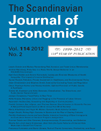
SCANDINAVIAN JOURNAL OF ECONOMICS
Innovating Insights for Global EconomiesSCANDINAVIAN JOURNAL OF ECONOMICS (ISSN: 0347-0520, E-ISSN: 1467-9442), published by Wiley, stands as a pivotal platform for disseminating research in the fields of economics and econometrics. With an impressive Q1 ranking in both disciplines, this journal plays a critical role in advancing theoretical and applied economic research, catering to an international audience of scholars, practitioners, and students. Its coverage from 1977 to 2024 demonstrates a robust commitment to publishing high-quality research that influences both policy-making and academic inquiry. Although it operates on a traditional subscription model, the journal remains accessible to a broad readership, which is essential for fostering knowledge sharing within the economics community. As such, the SCANDINAVIAN JOURNAL OF ECONOMICS is an essential resource for those seeking to explore the latest developments and methodologies in economic research, helping to bridge practical insights with academic rigor.

Seoul Journal of Economics
Advancing Economic Scholarship for a Global ImpactThe Seoul Journal of Economics, published by the Seoul National University Institute of Economic Research, stands as a significant peer-reviewed platform for advancing scholarship in the fields of economics, econometrics, and finance. As evidenced by its Q2 ranking in the Economics category for 2023, this journal plays a crucial role in disseminating high-quality research and fostering intellectual dialogue amongst scholars and practitioners. With a commitment to bridging theoretical frameworks and empirical findings, the journal covers a diverse array of topics central to modern economic inquiry. While the journal is not open access, it provides vital insights into the rapidly evolving economic landscape in South Korea and beyond, making it a valuable resource for researchers, professionals, and students who seek to enhance their understanding of contemporary economic challenges and methodologies. With its focus on collaboration and rigorous academic discourse, the Seoul Journal of Economics contributes significantly to the global economic knowledge base, encouraging impactful research that influences policy and practice.

ECONOMIST-NETHERLANDS
Navigating the Complexities of Economics with ExpertiseThe Economist-Netherlands, published by Springer, is a prestigious journal that has been a cornerstone in the field of economics since its inception in 1852. With a strong focus on disseminating high-quality research and insights, this journal serves as an essential resource for economists, researchers, and practitioners interested in the dynamic landscape of economic theory and applications. Currently ranked in the Q3 category in Economics and Econometrics, this journal demonstrates a commitment to scholarly rigor, as reflected in its Scopus ranking within the 55th percentile. The journal features an extensive scope that encompasses key topics relevant to both historical and contemporary economic challenges, fostering a vibrant academic discourse. While access is not open, the journal remains a vital publication for anyone seeking to advance their knowledge in the economic sector. With an enduring legacy, the Economist-Netherlands continues to contribute significantly to the evolution of economic scholarship.

Baltic Journal of Economics
Navigating the complexities of economics and politics.Baltic Journal of Economics, published by Routledge Journals, Taylor & Francis Ltd, is a distinguished platform for research in the fields of economics, political science, and international relations. With an ISSN of 1406-099X and an E-ISSN of 2334-4385, this Open Access journal has been committed to disseminating valuable research since 2014, providing scholars with unrestricted access to impactful studies. As a testament to its quality, the journal resides in the Q2 category within Economics and Political Science as of 2023, ranking highly in Scopus with a notable percentile in its respective fields. By bridging theoretical frameworks with practical implications, the *Baltic Journal of Economics* aims to foster a deeper understanding of contemporary economic and political challenges, making it an essential resource for researchers, professionals, and students dedicated to exploring these dynamic disciplines. With a publication timeline extending from 2008 to 2024, it welcomes diverse studies that contribute to the ongoing discourse in the social sciences, supporting the evolution of knowledge in a globalized context.
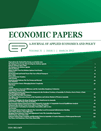
Economic Papers
Contributing to Policy-Making with Scholarly Excellence.Economic Papers is a prestigious journal published by WILEY, recognized for its contributions to the fields of economics, econometrics, and finance since its inception in 1982. With an impressive impact factor reflecting its scholarly influence, this journal is ranked in the Q2 category in the Economics, Econometrics, and Finance sector, placing it among the top 30% of journals in the field. The journal aims to disseminate high-quality research that addresses contemporary economic challenges, thereby advancing both theoretical understanding and practical applications. While currently not available as open access, Economic Papers provides vital insights for researchers, professionals, and students striving to deepen their comprehension of economic dynamics and contribute to sound policy-making. Scholars are encouraged to submit their work to engage with a robust academic community and impact the discourse in economic research.